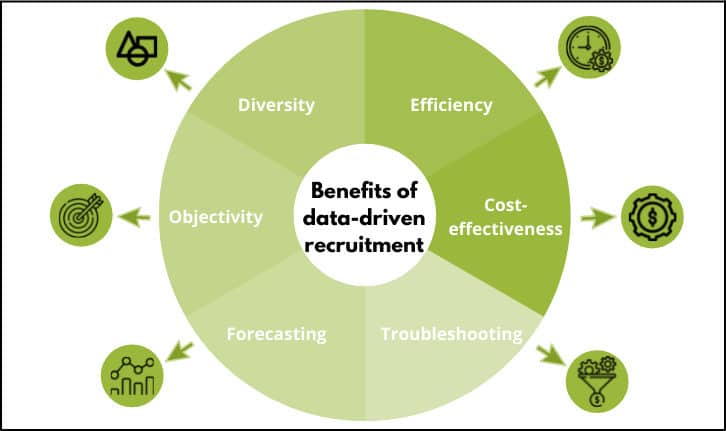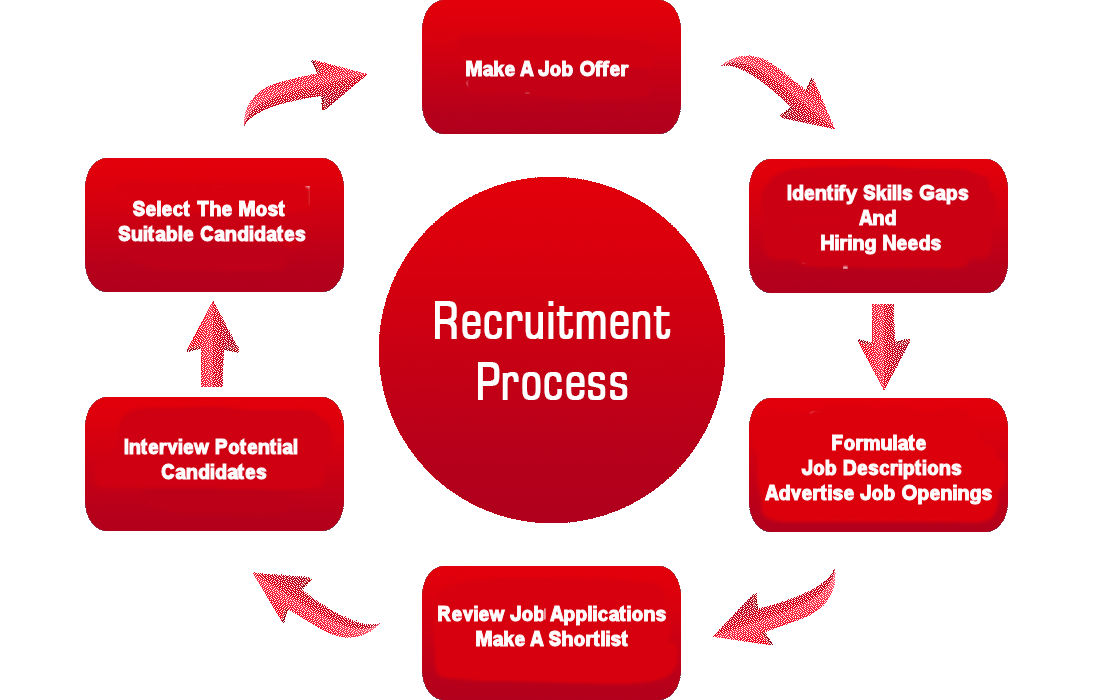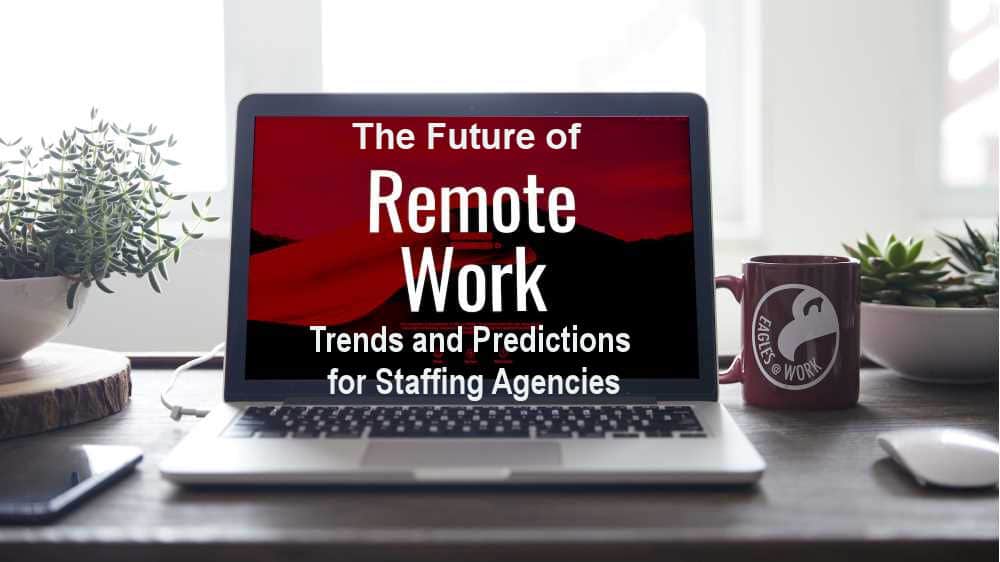En los últimos años, la forma en que enfocamos el trabajo ha sufrido un cambio sísmico debido al progreso tecnológico y a la pandemia del COVID-19. El trabajo a distancia, que en un principio fue una medida de emergencia, se ha convertido en un modelo operativo estándar en numerosos sectores. Las agencias de colocación se enfrentan a ventajas e inconvenientes con esta transición del lugar de trabajo.
En este blog, examinaremos las tendencias actuales que configuran el trabajo a distancia y cómo las empresas de dotación de personal pueden beneficiarse de estos cambios a la hora de identificar y retener el talento.
-
El auge de los modelos de trabajo híbridos
Una de las tendencias más significativas del trabajo a distancia es la aparición de modelos de trabajo híbridos. Los empleados insisten ahora en opciones de trabajo flexibles que impliquen trabajar desde casa y pasar tiempo en la oficina. Este cambio obliga a las agencias de empleo a replantearse sus estrategias de contratación.

Información práctica:
- Adaptar las descripciones de los puestos: Las descripciones de los puestos deben definir claramente si el puesto requiere trabajo a distancia, una combinación de trabajo a distancia y trabajo de oficina o asistencia a la oficina a tiempo completo. Destaque la flexibilidad que ofrece el puesto para aumentar la base de candidatos.
-
Mayor demanda de candidatos expertos en tecnología
Dado que las empresas están pasando a modelos de trabajo a distancia, su necesidad de candidatos competentes en tecnología ha aumentado rápidamente. Las herramientas de colaboración junto con el software de gestión de proyectos y los conocimientos de ciberseguridad se han vuelto esenciales para el trabajo.
Información práctica:
- Evaluación de competencias: Refuerce el proceso de contratación con evaluaciones de aptitudes para determinar el nivel de competencia de los candidatos en las herramientas necesarias. Así se garantiza que los empleados recién contratados puedan empezar a ofrecer resultados nada más incorporarse a la organización.
-
Centrarse en el bienestar de los empleados
El trabajo a distancia ha fusionado la vida personal y profesional, lo que lleva a las organizaciones a centrarse más en el bienestar de los empleados. Las agencias de colocación pueden aprovechar esta tendencia a la hora de identificar candidatos y ofrecer sugerencias a sus clientes.
Información práctica:
- Promover el equilibrio entre la vida personal y laboral: A la hora de presentar candidatos a los clientes, los responsables de contratación deben hacer hincapié en su capacidad para mantener un equilibrio saludable entre la vida laboral y personal. Un mayor énfasis en este aspecto puede mejorar la satisfacción laboral y reducir la rotación de empleados.
-
Mayor uso de la tecnología en la contratación
Las nuevas herramientas están cambiando la forma en que las empresas llevan a cabo sus campañas de contratación. La realidad virtual (RV) para la virtual onboarding processinteligencia artificial (IA) para la selección de currículos y sistemas de seguimiento de candidatos (ATS) son ahora estándar en las empresas de dotación de personal.
Información práctica:
- Invertir en tecnología: Las agencias de empleo necesitan invertir dinero en tecnologías de contratación que agilicen las operaciones y ofrezcan a los candidatos una mejor experiencia. Gracias a las herramientas de IA, las agencias pueden identificar de forma eficiente y eficaz a los mejores talentos.

-
La importancia de la marca del empleador
En el mercado laboral actual, marca empleadora se ha vuelto más vital que nunca. Los valores de una empresa, junto con su cultura positiva de trabajo a distancia, actúan como imanes que atraen a los candidatos que encajan con su filosofía.
Información práctica:
- Mostrar la cultura de la empresa: Deje que el sitio web y las redes sociales de su agencia muestren cómo son los lugares de trabajo de sus clientes y sus valores fundamentales a través de testimonios, visitas virtuales a las oficinas e historias de los empleados.
-
Reserva mundial de talentos
El trabajo a distancia permite a las empresas reclutar talentos en mercados mundiales a través de los cuales las agencias de colocación pueden encontrar candidatos de múltiples lugares. Esta tendencia aporta mayor diversidad y permite a las organizaciones encontrar los mejores talentos más allá de las barreras geográficas.
Información práctica:
- Ampliar los parámetros de búsqueda: Cuando busque candidatos, centre su búsqueda fuera de su región geográfica tradicional. Utilice bolsas de empleo internacionales, pero asegúrese de cumplir la legislación laboral de cada país.
-
Aprendizaje y desarrollo continuos
El trabajo a distancia ha puesto de manifiesto por qué el concepto de aprendizaje electrónico y desarrollo profesional es tan fundamental. En el mercado laboral actual, los empleados esperan seguir aprendiendo para sobresalir en sus carreras.
Información práctica:
- Promover oportunidades de aprendizaje: Anime a los clientes a ofrecer oportunidades de aprendizaje y programas de desarrollo profesional a sus empleados como parte de su propuesta de valor para el empleado. Esto puede ayudar a captar trabajadores motivados que quieran progresar.
-
Estrategias de contratación basadas en datos
Dado que el trabajo a distancia ha ampliado su alcance, la contratación debe incorporar el análisis de datos para tener éxito. A través de los datos, las agencias obtienen información sobre los mejores canales de contratación y los comportamientos de los candidatos, al tiempo que mejoran la toma de decisiones.

Información práctica:
- Utilizar métricas de contratación: Supervise indicadores esenciales como el tiempo de contratación, la calidad de los candidatos y la eficacia de las fuentes en sus prácticas de contratación. Al examinar estas métricas, las agencias pueden optimizar sus enfoques de contratación e impulsar la eficacia general de la contratación.
-
Crear estrategias eficaces de trabajo a distancia
A medida que el lugar de trabajo se expande por territorios mediante el trabajo a distancia compromiso y retención de los empleados dependen ahora de la fuerza de la cultura de trabajo a distancia. Las agencias de colocación pueden orientar a sus clientes sobre cómo establecer conexiones dentro de los equipos remotos.
Información práctica:
- Fomentar las actividades virtuales de creación de equipos: Sugiera a los clientes que inviertan su dinero en métodos de creación de equipos para equipos remotos y reuniones programadas para mantener la cultura de empresa. Esto puede ayudar a reducir la sensación de aislamiento y mejorar la colaboración conectando a los miembros del equipo que trabajan desde casa.
-
Cumplimiento de la normativa y aspectos jurídicos
Con el talento global llegan los retos de la legislación laboral global y el cumplimiento de la normativa que las empresas deben abordar. Como agencias de empleo, es fundamental conocer las implicaciones legales que conlleva la contratación de trabajadores remotos en distintas jurisdicciones.
Información práctica:
- Orientar sobre el cumplimiento: Crear un conjunto de herramientas o una oferta de consultoría para ayudar a los clientes con los procesos de contratación de empleados a distancia, incluido el cumplimiento de la legislación fiscal y laboral y la creación de contratos de trabajo.
-
Procesos de contratación preparados para el futuro
Debido a los continuos cambios en los modelos de trabajo a distancia, recruitment methods también deben cambiar en consecuencia. Las agencias de colocación deben estar preparadas para los cambios en las funciones y las cualificaciones necesarias, así como en las expectativas de los candidatos.

Información práctica:
- Adelántese a las tendencias del sector: Las opiniones de los expertos sugieren que el aprendizaje continuo es esencial, por lo que los suscriptores de seminarios web y publicaciones del sector deben mantenerse al día de las tendencias que puedan afectar a las estrategias de contratación y dotación de personal.
Conclusión
Las agencias de colocación deben aceptar que el trabajo a distancia representa una transformación fundamental del panorama laboral de cara al futuro.
Mediante la identificación y aplicación tempranas de los avances tecnológicos y los cambios en la cultura y las expectativas del lugar de trabajo, las agencias pueden establecerse como proveedores clave de servicios de contratación.
En este entorno en evolución, el énfasis en la flexibilidad, el bienestar y la mejora continua será primordial. Las agencias que utilicen datos, mejoren su marca de empleador y se centren en crear un lugar de trabajo remoto no solo podrán atraer a los mejores talentos, sino también ayudar a sus clientes a alcanzar el éxito en el mercado.
De cara al futuro, el principal factor de éxito de las agencias de colocación será su capacidad para innovar y transformarse en función de sus necesidades. Estarán plenamente preparadas para afrontar los nuevos retos del trabajo a distancia y aportar un valor significativo a los demandantes de empleo y a los empleadores cuando decidan abrazar su futuro desarrollo. Aunque el camino a seguir presenta muchas dificultades a las que los caminantes se enfrentan durante su trayecto, los beneficios potenciales son ilimitados para quienes consigan encontrar el camino correcto.



